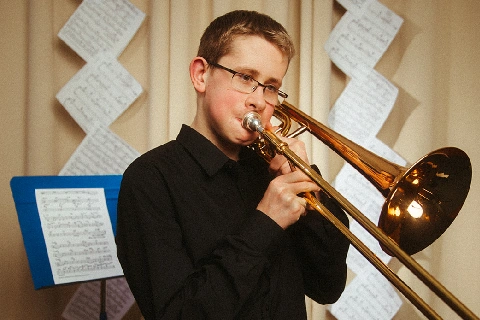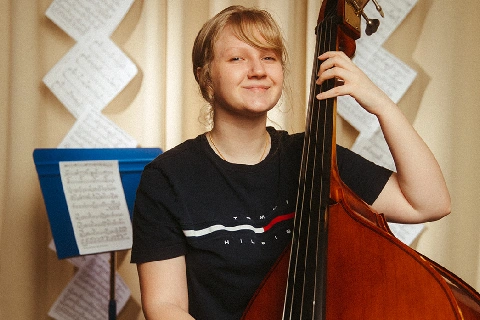The following are guidelines to help you have a successful, rewarding, experience in learning the trumpet and trombone. We have arrived at these conclusions after many years of teaching hundreds of students.
1. Starting at the Right Age
Voice students should wait until at least 7 years old in our opinion before beginning private singing lessons. For younger students singing in any group situation or group class would be a good primer. Our school offers Music, Drama, and Singing for Little Folks, for ages 4 to 7. During the summer we have Singing for Little Folks as a 2-week workshop. Most schools and churches offer opportunities for students to sing as a group. Any of these would be helpful until the child is ready for the more concentrated effort needed in private lessons.
2. Performing Builds Confidence
You don’t have to be a great musician to perform. A student that has a few months of dedicated practice should be able to sing at least one song from start to finish. It doesn’t have to be a difficult piece. The experience of performing builds the student’s confidence and creates the desire to tackle even more challenging material. A well-rounded musical program will include performance opportunities in the way of showcases, outdoor concerts, and other occasional events throughout the year. This can also be added to by joining a musical theatre workshop or a local singing group.
3. For the Best Results, Choose Private Instruction
In order to learn how to sing correctly, breathe properly, and hit the pitch consistently private lessons are undeniably the best way to go, since the student has the undivided attention of the instructor. This cannot be achieved in a choir or other performing class, since there is not enough time for the instructor or conductor to address technical issues.
4. Be Aware of the Quality of the Teacher
Of course there are many very good musicians that never studied their instrument formally. Some have learned by ear or picked up knowledge from friends along the way. But to be able to properly teach someone else, there should be a certain level of formal education that has been achieved. This way the student knows that the instructor has taken the time to train in the field that he is teaching. Not only do most of our instructors have university, college, or music conservatory degrees, but they also perform regularly on stages ranging from local to national.
When teaching children, knowing how to relate at their level and keep them motivated is just as important as being knowledgeable on the instrument. A good school will choose from a pool of many potential instructors, saving you the time and trouble of searching for a well qualified, professional teacher. In our music academy, the lessons are not just a hobby or sideline for the teacher but a career and responsibility, which are taken very seriously. Having the right combination of knowledge, ability, patience, and caring makes all the difference.
5. Learning in an Appropriate Setting
Not only is it necessary to have a qualified teacher, but also having an optimal learning environment is very important. With ½ to 1 full hour of lesson time per week, a professional school environment can produce better results since all of the time is focused on learning music and all of the tools and materials necessary are already in place. Although a traveling teacher sounds like a good idea for convenience sake, the reality is that there are distractions like phones, pets, or other kids which sometimes make concentrating difficult. It is also common during a lesson to have a situation come up where a specific problem needs to be addressed. With a complete library of musical materials and references readily available a teacher teaching at an academy can address the problem immediately rather than putting it off until the next week. Hearing peers who are at different levels of progress can also inspire students.
6. Purchase a Chromatic Tuner ASAP
A lot of people do not realize when they are singing a note a little out of tune. For a singer, this is a real problem. People may not understand what isn’t right when they hear someone sing a little off pitch, but they will know something isn’t quite right. Younger students, should rely on the teacher to tell them if the note is not correct, but teenagers and adults can practice hitting notes perfectly by using an electronic chromatic tuner. It will show if you are singing sharp (high) or flat (low) and allow you to adjust to the pitch, producing a green light that means you are in tune.
A chromatic tuner will usually cost between $15 and $30 depending on the brand, or a tuning app for your phone is even less, and will save you tons of time, frustration, and embarrassment by showing you if you are singing in tune.
7. Making Practice Easier
As in all things, improvement in singing takes practice. One of the main problems with learning to sing is the drudgery of practicing daily on the new skills that take so much repetition to master. How to make practice easier:
- Time – Set the same time each day to practice so that it becomes a routine or habit. This is especially good for children but works for adults too. The earlier in the day that this happens the more likely the practice will not be put off until tomorrow.
- Repetition – This method works quite well when setting practice schedules for beginners. For a younger person 20 or 30 minutes may seem like an eternity. Therefore instead of a time frame we suggest repetition. For example do this song 4 times each day and sing this scale 10 times a day. Then the clock is not the enemy, as soon as the work gets done (correctly) the child is free.
- Rewards – Children respond well to rewards. As parents we can reward the child by saying when your practice is complete you can have x number of minutes on the PlayStation or other coveted activity. As teachers we sometimes will use stickers or more importantly, the praise of the teacher “Excellent job, keep it up” can be the best reward. For adults, usually a nice cup of java or other beverage will make the experience a little more rewarding.
In conclusion, playing a musical instrument should be an enjoyable experience, not a stress inducer. There will be times, usually at the end of the term for children, or a big project at work for adults, when the student will not able to practice. The goal is to learn at your own pace, not at the pace your friend or idol learned. As long as you know that you want to learn the instrument and that you are giving it your attention as much as is realistically possible, then you are being successful. The fun is the journey.






Lori Wilson
As an adult just looking to start voice lessons for the first time, this was extremely helpful. Thank you for the tips!